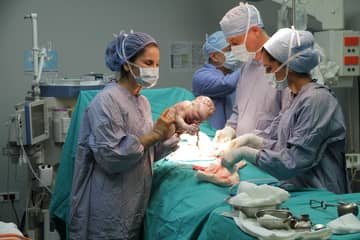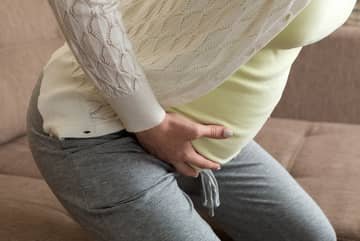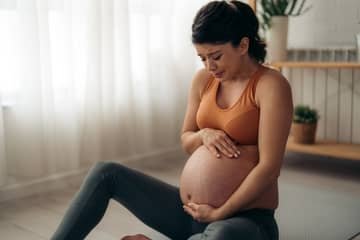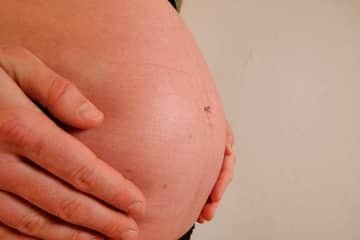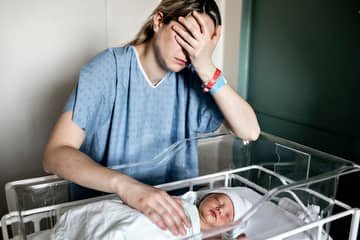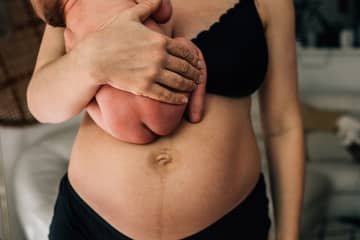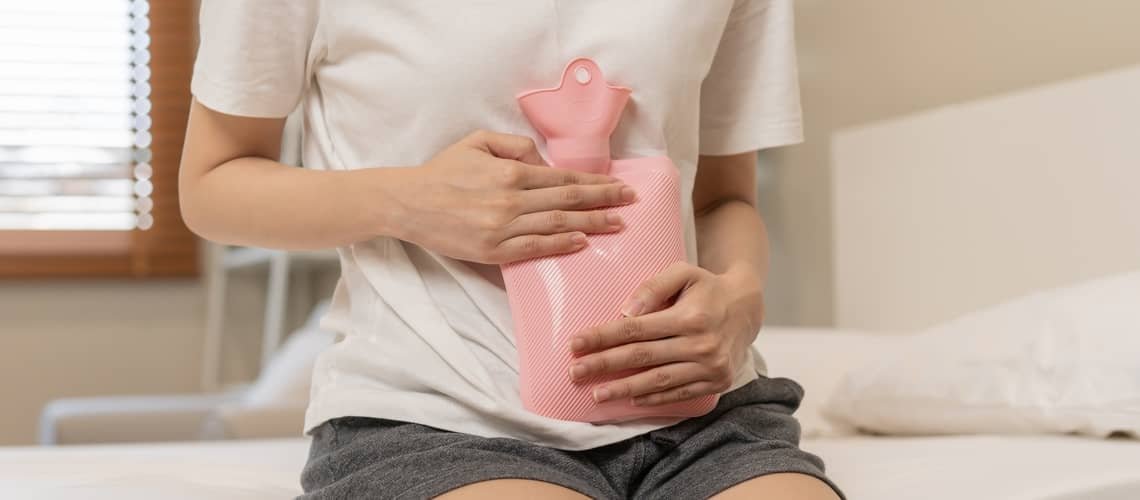
First menstruation after childbirth. Expect your period after six weeks
During pregnancy, many women enjoy being free from menstruation. Yes, hormonal and physiological changes may not always be the most pleasant - morning sickness, sore lower back, constipation and bloating or frequent urination are, however, the body's natural reaction to the changes that are happening in it. Although you may experience bleeding and discharge during this period, normal menstruation is not possible during pregnancy. Therefore, the question of when the first period starts after childbirth is important.
- The first menstruation after childbirth no earlier than six weeks
- Cleansing the body after childbirth - lochia
- Weak or heavy menstruation after childbirth?
- How long does menstruation last after childbirth?
- Prefer pads over tampons
- The course of the first menstruation after childbirth (PMS)
- When to seek medical help?
- The first menstruation after childbirth - experiences
- The most frequent questions - FAQ
- Comments
The reason is primarily the inconveniences associated with this monthly concern of a woman. So how long will the first period after childbirth last, will it be stronger or weaker than before pregnancy, and can a woman get pregnant even when she does not have a period after childbirth?
The first menstruation after childbirth no earlier than six weeks
The first menstruation usually appears 6-24 weeks after childbirth, but every woman's body is unique, so the question of when menstruation will come after childbirth cannot be answered unambiguously. For some women, it takes a year or more after giving birth, for some right after six weeks. It can appear at any time during breastfeeding, but also 6 weeks after the end of breastfeeding. If you do not breastfeed, you can get your period 4-5 weeks after giving birth, but also 3 months after the birth of the child. The average is around 3 to 8 months after giving birth. During breastfeeding, the female body produces the hormone prolactin, which blocks the function of the ovaries and thus the onset of menstruation. Again, every body is different and their hormones may work a little differently. Although breastfeeding women experience a later onset of menses, there are some exceptions.
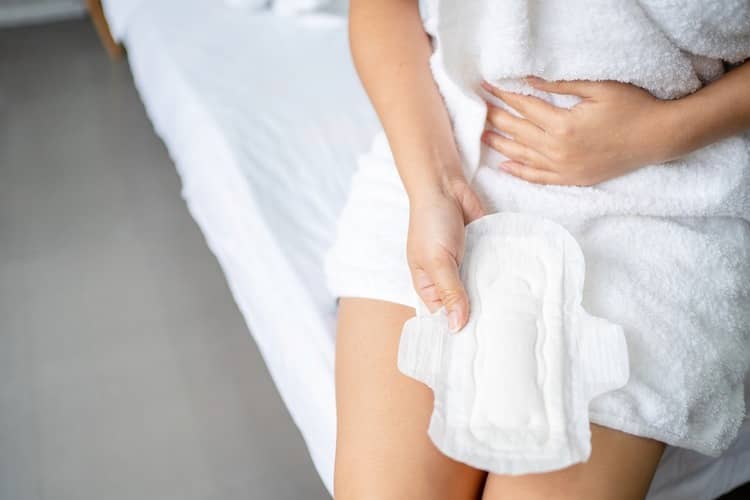
Cleansing the body after childbirth - lochia
After childbirth, the body is cleansed, during the sixth week there is a natural discharge called lochia. It doesn't matter whether you gave birth naturally or by caesarean section, all women bleed after giving birth. It is a discharge containing blood, mucus and uterine tissue, which is the result of the healing and cleansing of the uterus after childbirth. It starts shortly after birth and usually lasts 2 to 6 weeks, rarely it can last longer.
The color of the discharge changes during this period – at first it is red or brownish-red, gradually it has a darker brown color and finally its color changes to a lighter one. The first period after childbirth usually appears a few weeks after the end of discharge.
Weak or heavy menstruation after childbirth?
The first period after six weeks can be different from the menstrual bleeding before pregnancy. Many a new mother has experienced that her period returned in full force after giving birth. The first menstruation is often strong and painful, unpleasant cramps can appear even if you did not suffer from them before pregnancy. Usually, with the first menstruation, the lining of the uterus and blood clots are excreted from the birth. Lactating women often have very light bleeding/spotting before their first heavy period. Less often, menstruation is weaker and there are no or only minimal pains in the lower abdomen.
How long does menstruation last after childbirth?
Menstrual bleeding after childbirth depends on many factors, e.g. from the time you have lochia, and especially breastfeeding. This affects not only when menstruation occurs, but also how long it lasts. At first, menstruation is irregular and lasts for varying lengths of time. Sometimes it can be light spotting for two days, other times it can be heavy bleeding that lasts even a week.

Prefer pads over tampons
Many mothers wonder whether it is more appropriate to use pads or tampons after the birth of a child. The answer from gynecologists is clear - pads are more suitable. And for several reasons. It is more comfortable (especially if you had a vaginal birth), but also more hygienic. When using pads, you have a better overview of the amount of blood, its color and possible clots. Pads are also a better choice in the case of postpartum discharge, in which case tampons are not permissible at all.
After discharge and the first period, if everything goes well, you can return to tampons or a menstrual cup. Do not forget to replace them regularly.
The course of the first menstruation after childbirth (PMS)
Menstrual bleeding is very often preceded by a hormonal imbalance and is associated with typical physical and psychological problems. Therefore, many women may experience postpartum menstruation related symptoms. You may experience mood changes, irritability, loss of self-control, aggressiveness, anxiety, fatigue, restlessness, decreased ability to concentrate, overeating, headaches, back and lower abdomen pain. If this is also your problem, you can manage PMS by adjusting your diet and lifestyle. Increase fluid intake, limit drinking coffee (enough during menstruation), intake of sugar and salt, but also red meat. Treat yourself to foods rich in potassium (bananas, tomatoes, peaches) and include fish, white meat, whole grain bread, asparagus, artichokes, watercress, parsley, figs and dates in your diet. Movement in the fresh air helps, not excessive physical exertion, maximum hygiene and relaxation (regular sleep, relaxing music, aromatherapy).
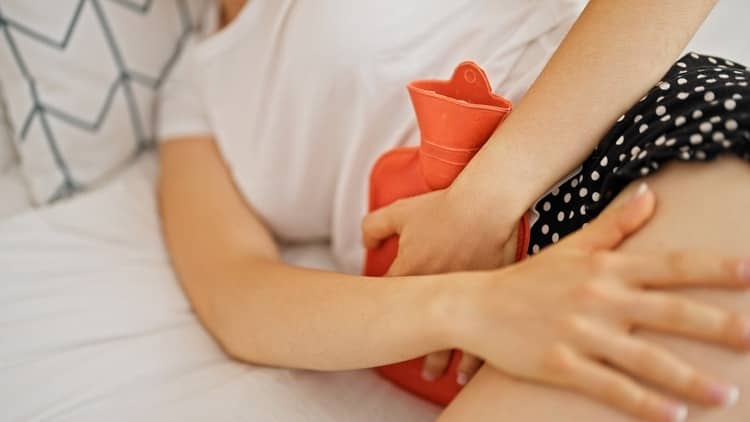
When to seek medical help?
Consult a gynecologist if you have a severe course of premenstrual syndrome, if the bleeding is very heavy and long (lasts more than 7 days) and you have great pai. See a doctor even if the discharge has a strange smell, the bleeding is accompanied by cramps in the lower abdomen and a temperature.
The first menstruation after childbirth - experiences
Women discuss a lot about the first period after childbirth. It is clear from their posts on the forums that when the first period comes after childbirth is very individual. Some mothers got their periods several months (a month or two) after breastfeeding, i.e. after a few months, a year or two after giving birth, others still during breastfeeding (10 weeks or a few months). In mothers who did not breastfeed, menstrual bleeding usually appeared shortly after the sixth week.
The most frequent questions - FAQ
We hope that in our article you found all the information you were looking for about the first period after childbirth. At the end, we have answered the frequently asked questions that interest you about this topic. If you want to ask something else, you have space in the comments below the article. We will be happy if you share your experience in the discussion and thus help women who are dealing with the issue of the first period after childbirth.
Is irregular menstruation typical after childbirth?
Can I get pregnant while breastfeeding and not having a period?
Why isn't my period coming even though I'm not breastfeeding?
Pridať komentár

